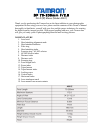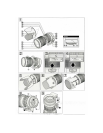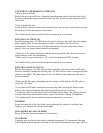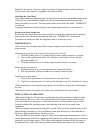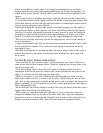harmful to the picture. However, please be aware of the precautions stated in the next
section when your camera is equipped with a built in flash.
Attaching the Lens Hood
Align Hood attaching alignment mark (2) on the hood with the corresponding index mark
(5) on the lens. Press the hood lightly onto the hood attaching bayonet ring and then
rotate it clockwise to secure. The lens hood will be secure when the mark “TAMRON O”
is at the top.
*Improper attachment of the hood may cause large shadowed areas in your pictures.
Stowing lens hood on the lens
Reverse the lens hood. Point the lens toward the opening, then align the hood attaching
index on the lens with the hood attaching indicator, “TAMRON O”, on the hood.
Turn the hood clockwise until the alignment mark is at the top to set it.
TRIPOD MOUNT
A001 comes with a tripod mount. When using a tripod, mount the lens to it using the
tripod mount.
Changing the position of the camera horizontally and vertically
1. Turn the locking screw (15) on the tripod mount counter-clockwise to loosen.
2. Line up the tripod mount index (14) with the vertical index (16) or with the
horizontal index (17).
3. Turn the locking screw (15) on the tripod mount clockwise to secure.
Removing the tripod mount
1. Turn the locking screw on the tripod mount counter-clockwise.
2. The tripod mount will loosen and can be removed from the lens.
Installing the tripod mount
1. Loosen the tripod mount (13) and attach it to the lens barrel.
2. Tighten the tripod mount (13) and turn the locking screw (15) clockwise to secure.
*When attaching or removing the tripod mount, be careful not to drop the camera and/or
the lens.
*Be cautious when carrying the lens while lens is attached to the tripod mount.
PRECAUTIONS IN SHOOTING
-The optical design for Di takes into consideration the various features of digital single
reflex cameras. However, due to the configuration of the digital single reflex cameras,
even when auto focus accuracy is within specifications, the focal point may be a little
forward or behind the optimum point when shooting with auto focus under some
conditions.
-The lens employs an internal focusing (IF) system. Because of the characteristics of this
optical design, the angles of view at distances other than infinity are wider than that of
the lenses applying an ordinary focusing system.
-When the built-in-flash on the camera is used, adverse photographic phenomena such as
corner illumination fall-off or vignetting at the bottom part of the image may be observed,
especially in wide angle ranges. This is due to the inherent limitation of the coverage of
the built-in-flash, and/or the relative position of the flash to the edge of the lens barrel



